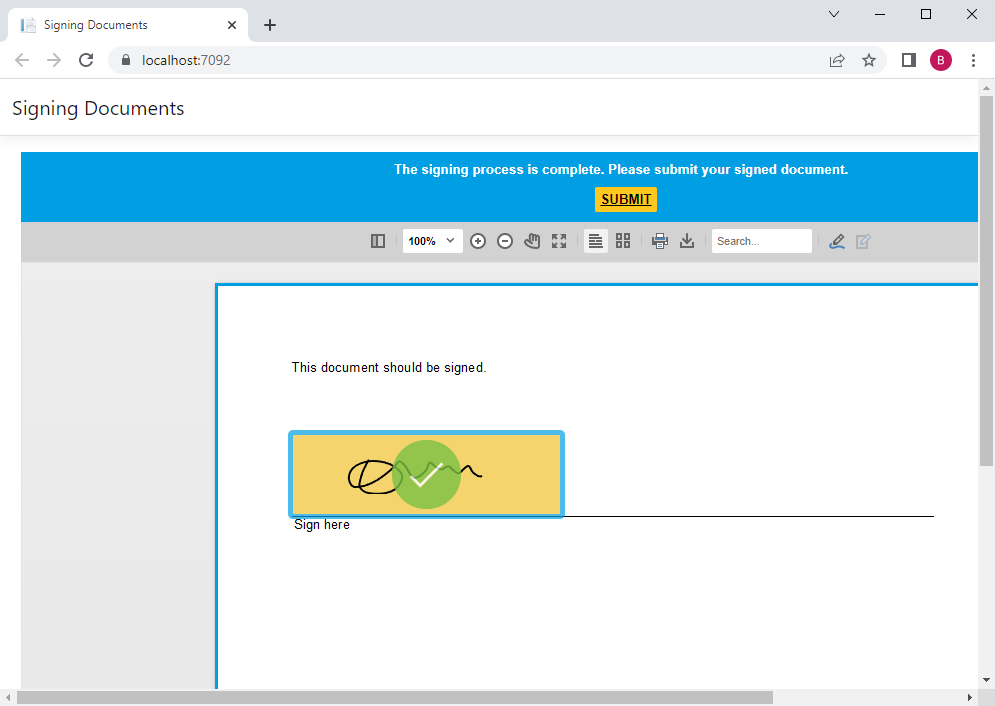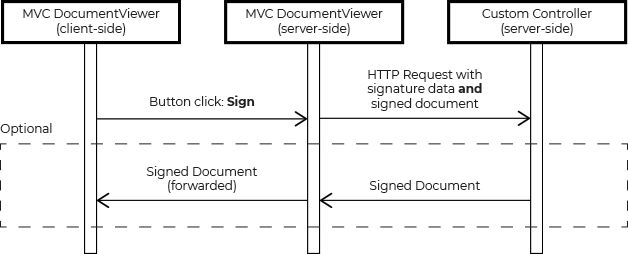Digitally Sign Signature Fields with PFX Certificates
This getting started tutorial shows how to electronically sign documents using the Document Viewer and how to digitally sign the signed signature fields server-side.

This article shows how to use the Document Viewer to acquire an electronic signature and to digitally sign the signature fields by routing the request to a custom controller method.
Redirect URL
In version 31, a redirect URL can be provided using the Redirect
@Html.TXTextControl().DocumentViewer(settings => {
settings.DocumentPath = "App_Data/template.docx";
settings.Dock = DocumentViewerSettings.DockStyle.Fill;
settings.ShowThumbnailPane = false;
settings.SignatureSettings = new SignatureSettings() {
ShowSignatureBar = true,
OwnerName = "Paul Paulsen",
SignerName = "Tim Typer",
SignerInitials = "TT",
RedirectUrlAfterSignature = this.Url.Action("SignDocument", "Home", null, Context.Request.Scheme, null),
SignatureBoxes = new SignatureBox[] {
new SignatureBox("txsign") {
SigningRequired = true, Style = SignatureBox.SignatureBoxStyle.Signature }
}};
}).Render()The following screenshot shows the Document Viewer that is used to acquire the electronic signature (drawing) from the user:

Custom Processing
After the user signed the document, the electronic signature is patched to the document and forwarded to the given URL including signature data such as the signature image and timestamp information. The following sequence diagram shows this workflow:

The implemented HttpPost endpoint SignDocument is requested by the Document Viewer after the signing process. In this method, a digital certificate is applied to the signed electronic signature representation using the Signature
[HttpPost]
public string SignDocument([FromBody] TXTextControl.Web.MVC.DocumentViewer.Models.SignatureData data) {
byte[] bPDF;
// create temporary ServerTextControl
using (TXTextControl.ServerTextControl tx = new TXTextControl.ServerTextControl()) {
tx.Create();
// load the document
tx.Load(Convert.FromBase64String(data.SignedDocument.Document),
TXTextControl.BinaryStreamType.InternalUnicodeFormat);
// create a certificate
X509Certificate2 cert = new X509Certificate2("App_Data/textcontrolself.pfx", "123");
// assign the certificate to the signature fields
TXTextControl.SaveSettings saveSettings = new TXTextControl.SaveSettings() {
CreatorApplication = "TX Text Control Sample Application",
SignatureFields = new DigitalSignature[] {
new TXTextControl.DigitalSignature(cert, null, "txsign")
}
};
// save the document as PDF
tx.Save(out bPDF, TXTextControl.BinaryStreamType.AdobePDFA, saveSettings);
}
// return as Base64 encoded string
return Convert.ToBase64String(bPDF);
}Return Signed PDF
In this sample project, the created PDF document is returned as a Base64 encoded string. Whatever is returned by this endpoint is automatically forwarded to the client-side method specified through the set
window.addEventListener("documentViewerLoaded", function () {
TXDocumentViewer.signatures.setSubmitCallback(signatureComplete);
});
function signatureComplete(e) {
var element = document.createElement('a');
element.setAttribute('href','data:application/pdf;;base64,' + e);
element.setAttribute('download', "results.pdf");
document.body.appendChild(element);
element.click();
}Also See
This post references the following in the documentation:
- TXText
Control. Web. MVC. Document Viewer. Signature Settings. Redirect Url After Signature Property - TXText
Control. Save Settings. Signature Fields Property - TXText
Control. Digital Signature Class - TXText
Control. Signature Field Class
![]()
Download and Fork This Sample on GitHub
We proudly host our sample code on github.com/TextControl.
Please fork and contribute.
Requirements for this sample
- TX Text Control .NET Server
- Visual Studio 2022
Related Posts
ASP.NETASP.NET CoreDocument Viewer
Securing the Signature Endpoint with Custom ActionFilterAttributes
The HttpPost endpoint to which the signed document is forwarded can be in the same application or a completely different application. This tutorial will show you how to secure this endpoint…
ASP.NETASP.NET CoreDocument Viewer
Common Web API Methods for Handling E-Signature Workflows in ASP.NET Core C#
Capturing electronic signatures and signing signature fields with certificates is a common feature of the TX Text Control Document Viewer. The most common server-side Web API methods for handling…
ASP.NETASP.NET CoreElectronic Signatures
Replace Words at the Input Position with Formatted Content from a Web API
Writing assistance and placeholder replacement are advanced features that help users create professional documents. This sample shows how to replace the word at the current input position with…
ASP.NETASP.NET CoreElectronic Signatures
Preparing Documents for Electronic Signatures using MailMerge in C#
There are many benefits to using MS Word compatible templates to prepare documents for electronic signature capture. This article shows how to use MailMerge to prepare documents for the signing…
ASP.NETASP.NET CoreDocumentViewer
Electronic Signatures: Requesting Signatures from Multiple Signers using…
This sample shows how to request signatures from multiple signers by using custom signature workflows and routing signature requests to custom endpoints.

